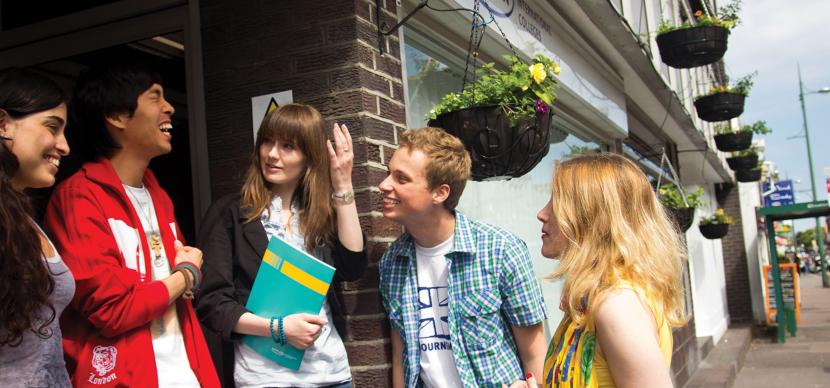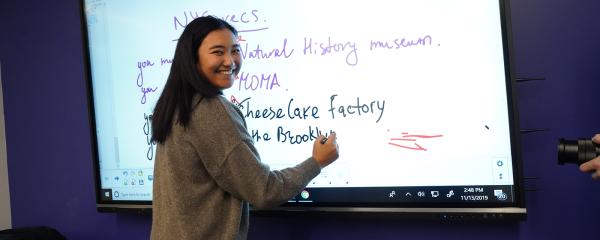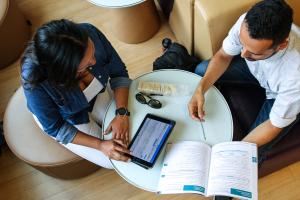Does Being Bilingual Change your Personality

There’s no doubt that learning a language can do incredible things for your life. We’ve explored evidence that, along with greater freedom to travel and better access to career and academic opportunities, becoming bilingual can boost your intelligence and your creativity.
But there’s more to success than even these impressive traits. No matter how intelligent or creative you are, it won’t get you far if you’re too shy to mention your ideas or too anxious to reach for an opportunity. If you tend to get frustrated if the people around you don’t conform to your expectations, or if you’d always prefer to stick to what’s familiar rather than take a risk or consider something new, you may end up creating obstacles for yourself.
Our students often tell us they feel they’ve done more than gain a useful new skill – they feel they’ve changed as people. Ibrahim, for example, developed an intense interest in multiculturalism after learning English in Philadelphia. “I believe I have changed a lot,” he told us.
“English has become my new culture, my new personality and my communication bridge with the world.”
“Studying with different people makes you more open to differences,” Gabriele agreed, after studying in Vancouver, “and I think that it’s one of the most important qualities in a person.”
Miyuki studied English in Los Angeles. For her the changes she noticed in herself were different, but just as important: “Before I was so shy,” she explained. “But as I continued studying English I became more confident. I think I have improved not only in my English but also my personality has developed into a stronger, more confident person.”
Some bilinguals talk about shuttling back and forth between personalities when they shift languages. Federico Prandi, a blogger and marketing specialist, explains that he’s not an ideal party-guest when speaking his native Italian – morose, anti-social, and taciturn. But in English, he’s a cheerful, friendly social butterfly.
“It has nothing to do with the people or with my language skills; it’s just that I feel more free, more funny and so very close to having sober fun whenever I speak English.”
Federico Prandi
Does learning a language change your personality in a way that’s actually measurable by science? Are the changes only temporary – lasting only as long as a conversation in your new language – or do they go deeper? Whenever you learn anything you change your brain – could these changes show up in the way you tackle problems or the interests you pursue, as well as in your academic skillset?
And if so, what do the changes look like?
A richer sense of identity
How would you complete this sentence?
“When my wishes conflict with my family …”
This was just one of the verbal tasks Susan Ervin-Tripp gave to bilingual Japanese women living in San Francisco in 1968. The women gave strikingly different answers depending on the language they used, for instance:
Japanese: “When my wishes conflict with my family, it is a time of great unhappiness.”
English: “When my wishes conflict with my family, I do what I want.”
Overall, the women’s Japanese answers tended to be meek and self-effacing, while their English answers were assertive and confident. Of course, one explanation could be that this was more about the cultural differences than the languages themselves. After all, the USA tends to value personal freedom and independence whereas Japan puts a greater emphasis on patience and family loyalty. Maybe, having moved to the USA, the women were simply accustomed to trying to fit in?
But other studies have shown similar results. In 1998 Michèle Koven asked Portuguese-French bilinguals to tell a a story about an annoying experience in both their languages. She then asked fellow Portuguese-French bilinguals to listen to the recorded stories and describe their perceptions of the speakers’ personalities. Even when telling the same story, the speakers came across as very differently. One woman was characterized as shy, diplomatic, and even “a victim”, in her native Portuguese, whereas she was tough, outspoken and willing to stick up for herself in her second language. “In French,” one listener observed, “she’s more of a fighter.”
While these studies did not directly compare the subjects before and after becoming bilingual, the acquisition of a whole extra dimension of personality is itself a huge change. How would the Japanese-American women of Ervin-Tripp’s study have ever known they could be blunt and forceful if they’d never learned their second language? Would Federico Prandi ever have discovered his inner party animal without his bilingualism?
Greater confidence
From Ervin-Tripp’s 1960s studies to Prandi’s anecdotes, there seems to be a pattern in the different selves the bilinguals discovered: they tend to be bolder, less shy, more likely to speak up for themselves.
In 2017 Thomas Wedérus interviewed Swedish-English bilinguals living in Dublin, and found that 11 out of 12 found it easier to express emotions in English. Many said they found themselves more confident about chatting to strangers, and even less nervous about public speaking:
“I used to do lots of presentations. We had this oral presentation class and it was always like 'God, why do I get so extremely nervous when I have to speak Swedish but not at all as nervous when I get to speak English?', it was a very clear difference. . . . I think it had to do with this sort of English persona having more self-confidence while the Swedish personality maybe didn't have quite as much.”
One interesting aspect of Wedérus’ findings is that while Ireland and Sweden are far from identical cultures, they are very similar on rankings for emotional expressiveness and individualism — much more similar than the USA and Japan, for instance. So although Wedérus can’t rule out cultural influences, (perhaps English language TV shows, for example) it’s harder to put the subjects feeling more outgoing and self-confident down to culture alone.

It might seem counter-intuitive that bilinguals often feel more at ease expressing their feelings in their second language. You may remember from our article about language-learning and intelligence that bilinguals tend to be less emotional, and therefore more rational when weighing up choices in their second language. Learning a language often takes a considerable degree of intellectual effort – and even when you’ve achieved proficiency, communicating in your second language may always require more conscious attention your first. In fact, the distancing effect of a second language may be exactly why bilinguals find they can explore a daring and expressive side of their personality. Applied linguists Aneta Pavlenko and Jean-Marc Dewaele asked over 1000 multilinguals the question, ‘Do you feel like a different person sometimes when you use your different languages?” 65% of respondents confirmed that they did feel different, and on analyzing their responses, Pavlenko and Dewaele found that they often commented that communicating in their second language felt slightly like acting a part, but that this had given them the opportunity to explore new ways of being themselves, free of the inhibitions they associated with their first language.
"Speaking my [first language] is like being in my own skin: a completely natural and comfortable feeling. Using my [second language] is perhaps like wearing gorgeous clothes and evening make-up … not completely natural but it allows me to shine and appear ‘beautiful’.”
Lasting change
But does this mean the confidence boost of speaking a second language simply melts away when you go back to speaking your first? Wedérus’s participants didn’t think so. One remembered how her new, confident English-speaking self had once felt like a separate personality – but things had changed. “You know, that person that I was in English was maybe a little more daring, more out there, more outgoing.” Now her English and Swedish personalities had merged into one, someone who was “more daring, more fun and carefree” all the time.
And further research suggests this is a common effect. Jean-Marc Dewaele has continued to study the link between language learning and personality changes alongside Nicole Tracy-Ventura, Zeynep Köylü, and Kevin McManus. The team interviewed language students on their return from a year spent studying abroad, and asked them to discuss any changes they’d noticed in themselves. Only two students thought they had not changed – and both observed that they had already spent long periods studying abroad before. 77% said they were now more confident – not just in their second language, but in life in general. Many said that they now often reminded themselves that having handled difficult phone calls, awkward conversations and the responsibilities of daily life in in their second language, they were far less likely to be nervous when encountering such situations at home. Others were more focused on the sense of optimism and self-belief they’d gained from conquering the obstacles in their path to fluency:
“I am capable of living on my own, of surviving in a foreign country with nobody around. And nobody can take that away from me, if you see what I mean.”
“I think it's made me a little bit more brave about doing things in general. You will feel uncomfortable at the beginning […] and it is kind of awkward, but you just do it.”
What might you do with a little extra faith in yourself? How would life change if you were more “daring”, more outgoing and better at standing up for yourself? Amazing as these changes can be, they’re just the start. Next time we’ll be looking at whether learning a new language really can make you more open-minded – and what that could mean for your life.
 617 275-5955
617 275-5955




